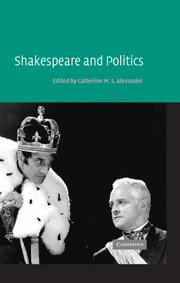Book contents
- Frontmatter
- Contents
- List of contributors
- Editor's note
- 1 Shakespeare and politics: an introduction
- 2 Shakespeare and politics
- 3 Henry VIII and the deconstruction of history
- 4 Livy, Machiavelli, and Shakespeare's Coriolanus
- 5 Richard II and the realities of power
- 6 Plutarch, insurrection, and dearth in Coriolanus
- 7 Some versions of coup d'état, rebellion, and revolution
- 8 Language, politics, and poverty in Shakespearian drama
- 9 ‘Demystifying the mystery of state’: King Lear and the world upside down
- 10 Venetian culture and the politics of Othello
- 11 The Bard and Ireland: Shakespeare's Protestantism as politics in disguise
- 12 Henry V as working-house of ideology
- 13 ‘Fashion it thus’: Julius Caesar and the politics of theatrical representation
- 14 Take me to your Leda
- 15 Macbeth on film: politics
- 16 William Shakespeare's Romeo + Juliet: everything's nice in America?
- Index
10 - Venetian culture and the politics of Othello
Published online by Cambridge University Press: 05 June 2012
- Frontmatter
- Contents
- List of contributors
- Editor's note
- 1 Shakespeare and politics: an introduction
- 2 Shakespeare and politics
- 3 Henry VIII and the deconstruction of history
- 4 Livy, Machiavelli, and Shakespeare's Coriolanus
- 5 Richard II and the realities of power
- 6 Plutarch, insurrection, and dearth in Coriolanus
- 7 Some versions of coup d'état, rebellion, and revolution
- 8 Language, politics, and poverty in Shakespearian drama
- 9 ‘Demystifying the mystery of state’: King Lear and the world upside down
- 10 Venetian culture and the politics of Othello
- 11 The Bard and Ireland: Shakespeare's Protestantism as politics in disguise
- 12 Henry V as working-house of ideology
- 13 ‘Fashion it thus’: Julius Caesar and the politics of theatrical representation
- 14 Take me to your Leda
- 15 Macbeth on film: politics
- 16 William Shakespeare's Romeo + Juliet: everything's nice in America?
- Index
Summary
In Othello Shakespeare represents a society in many ways fundamentally different from his own, and rather than minimizing or obscuring these differences he explores them in a politically creative way. The play is a powerful illustration of his ability to perceive and represent different forms of political organization, and to situate personal relationships and issues of individual subjectivity in a specific institutional context. Here and in much of his other work Shakespeare displays what might be described as a sociological imagination. He portrays in Othello not a feudal monarchy or Renaissance court but an enduring Italian city-state, a republic which continued to survive despite growing Habsburg domination in the rest of the peninsula. Taken in the context of his career as a whole the play is a fascinating example of Shakespeare's interest in republicanism, which is evident from ‘The Rape of Lucrece’ to The Tempest. It provides clear evidence that he was neither an uncritical advocate of conservative Tudor ideology, as an older critical tradition maintained, nor a writer materially unable to think and imagine beyond the monarchical paradigm, as a more recent historicist criticism has sometimes suggested. In the English context the act of representing a republican culture was itself a progressive gesture, since Venice offered an existing and stable alternative to the ‘natural’ and ‘eternal’ order of monarchy. In addition to this, and to a degree not usually recognized, Shakespeare represents the city's institutions exercising a shaping influence on personal relationships and individual experience.
- Type
- Chapter
- Information
- Shakespeare and Politics , pp. 169 - 184Publisher: Cambridge University PressPrint publication year: 2004
- 2
- Cited by



